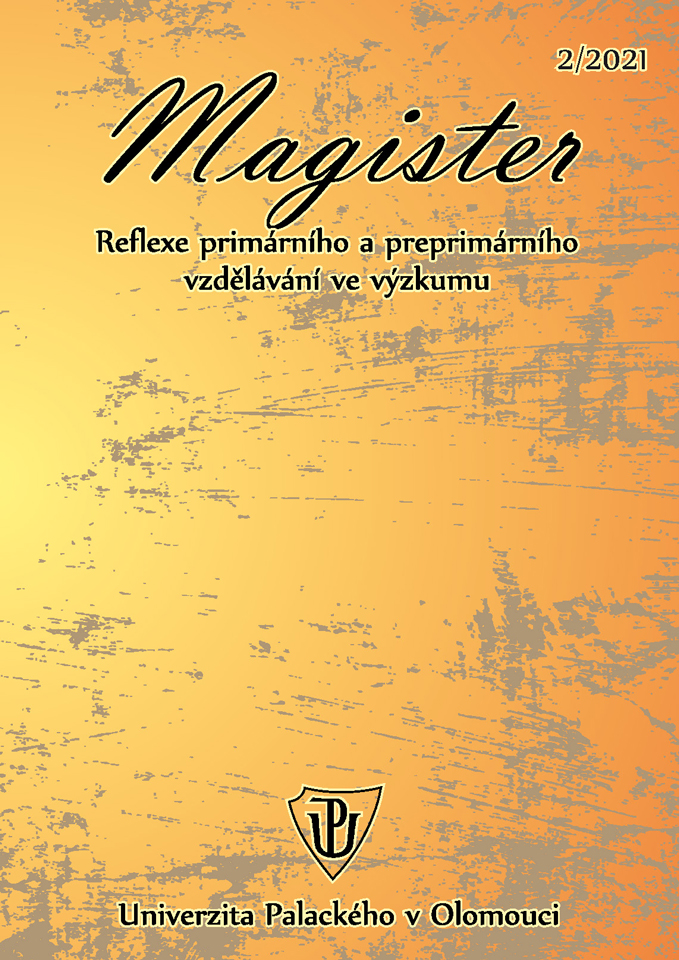Finding the ways of the novice teacher in inclusive education
DOI:
https://doi.org/10.5507/magister.2021.144Keywords:
Beginning teacher, Collaborative learning, Teaching methods, Organizational forms of teaching, Action researchAbstract
This paper presents the process and results of an action research study of a novice teacher in collaborative learning practice.1 The author of this paper has been involved in collaborative learning issues in her professional life as a researcher and a novice teacher in one role. It is co-teaching that has completely changed the way we look at teaching and the author is aware of this fact. She began to ask questions about the use of teaching methods, organizational forms of teaching and resources and their use in collaborative learning. The aim of the action research was to find appropriate teaching methods, organisational forms of teaching and resources that positively exploit the learner's potential and respond to their individual needs in accordance with the philosophy of collaborative learning. Furthermore, the paper reflects on whether the chosen methods, forms and means can motivate pupils to take responsibility for their learning. The author's class was fully involved in the action research, and they were not only the main actors but also the co-directors of the whole research. It was these pupils who were given the opportunity to make decisions, express their opinions and give direction to the whole research. The action research was conducted according to Kemmis and McTaggart's model consisting of cyclical phases of action, evaluation and reflection (2014). The method of direct observation and semi-structured focus group interviews were also used for each phase. The results show the importance of choice, task differentiation and participation in lesson design for students in collaborative learning.
References
Booth, A. & Ainscow, M. (2000) Index for inclusion.Centre for Studies on Inclusive Education.
Ferdanová, J. (2015). Typologie výukových strategií podporující inkluzi ve vzdělávání. Studia paedagogica, 20 (3), 131 – 144.
Forlin, C. (2010). Teacher Education for Inclusion: Changing Paradigms and Innovative Approaches. Routledge
Gruberová, L. (2020). Dilemata začínajícího učitele spojená s inkluzí (Diplomová práce).
Hájková, V. (2010). Inkluzivní vzdělávání: teorie a praxe. Grada.
Hanušová, S., & Píšová, M. (Eds.). (2017). Chtějí zůstat nebo odejít? Začínající učitelé v českých základních školách. Masarykova univerzita. https://dspace.cuni.cz/handle/20.500.11956/117439
Jordan, A. (2009). Preparing teachers for inclusive classrooms. Teacher and Teaching Education, 25 (4), 535-542
Kalhous, Z. & Horák, F. (1996). K aktuálním problémům začínajících učitelů. Pedagogika, 46 (3), 245 – 255.
Kemmis, S. & McTaggart, R. (2014). The Action Reasearch Planner: Doing Critical Participatory Action Research. Springer
Kratochvílová, J. (2015). Výukové strategie podporující hodnoty inkluze na prvním stupni základní školy. In Šafránková, D., Podroužek, L. & Slowík, J. (Eds.), Sborník z 23. konference České asociace pedagogického výzkumu. Západočeská univerzita v Plzni.
Michalík, J. (Eds.). (2018). Postoje pedagogických pracovníků k vybraným aspektům společného vzdělávání. Univerzita Palackého v Olomouci.
MŠMT. (2017). Školský zákon č. 561/2004 Sb., o předškolním, základním, středním, vyšším odborném a jiném vzdělávání. https://www.zakonyprolidi.cz/cs/2004-561
Nezvalová, D. (2003). Akční výzkum ve škole. Pedagogika, 53 (3), 300 –308.
Novotná, J. (2019). S čím se učitelé potýkají při výuce ve společném vzdělávání. In Perspektivy inkluzivního vzdělávání: Sborník příspěvků ze závěrečné konference pořádané v rámci projektu OPVV cesty k inkluzi (s. 8 – 17). Západočeská univerzita v Plzni.
Podlahová, L. (2004). První kroky učitele. Triton.
Spilková, V. & Wildová, R. (2014). Potřebujeme kvalitní nebo kvalifikované učitele? Pedagogická orientace, 24 (3), 423 – 432.
SYPO. (2018) Začínající učitelé. https://www.projektsypo.cz/125-zacinajiciucitele-ke-stazeni.html
Šimoník, O. (1995). Začínající učitel: Některé pedagogické problémy začínajících učitelů. Masarykova univerzita.
Štech, S. (2018). Inkluzivní vzdělávání – obtížné zvládání “rozmanitosti“ v praxi. Pedagogická orientace, 28 (2), 382 – 398.
Vašutová, J. (2007). Být učitelem: Co by měl učitel vědět o své profesi. Univerzita Karlova v Praze, Pedagogická fakulta.
Žák, V. (2012). Metody a formy výuky. Národní ústav pro vzdělávání.
Downloads
Published
Issue
Section
License

This work is licensed under a Creative Commons Attribution-ShareAlike 4.0 International License.


